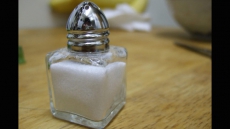MADRID - A Spanish nursing assistant may be the first person in the ongoing epidemic to catch Ebola outside of Africa, but she probably won't be the last, experts warn.
Still, even as more people with Ebola arrive on European shores, the continent's sophisticated health systems, legions of doctors and nurses, and preparedness plans will probably squash any big outbreaks of the lethal virus.
Extremely high vigilance is needed when caring for people with Ebola, so doctors say even small lapses in infection control can allow for the accidental spread of the virus to health staff.
Dr. German Ramirez of the Carlos III hospital said the nurse, Teresa Romero, remembers she once touched her face with her glove after leaving the quarantine room where an Ebola victim was being treated.
"It appears we have found the origin" of Romero's infection, Ramirez said, but he cautioned the investigation was not complete.
Romero was said to be in stable condition Wednesday. Health authorities in Madrid have been accused of not following protocol and poorly preparing health workers for dealing with Ebola, but some health officials said it was almost inevitable.
"What happened in Spain is unfortunate, but given the size of the outbreak in West Africa, we can expect to see more cases in different countries, including in Europe," said Dr. Isabelle Nuttall, a director at the World Health Organization tasked with helping countries prepare for Ebola. West Africa is currently battling the biggest-ever outbreak of Ebola, which doubles in size roughly every three weeks.
WHO earlier issued guidelines for all countries on how to prepare for the arrival of suspected and confirmed cases, and the agency doesn't see any reason to change that advice in the aftermath of the Spanish infection, Nuttall said.
"At the top of the priority list is good training and infection-control practices before any Ebola cases arrive," Nuttall said. She said the agency's efforts were focused on helping countries in Africa. "We're not too worried about preparations in Europe," she said.
Prime Minister Mariano Rajoy of Spain defended the country's health care system in Parliament on Wednesday, saying it is "one of the best in the world."
Meanwhile, dozens of animal rights activists scuffled with police outside the apartment complex where Romero and her husband live, trying to stop workers from taking away their dog, Excalibur. Protesters briefly halted a police van as it pulled away with the family pet inside, but police with batons cleared a path.
Madrid regional's government later said the animal was sedated, euthanized and incinerated. Authorities had obtained a court order to kill the dog, saying they could not rule out the possibility Excalibur could spread the virus.
At a meeting of the European Commission's Health Security Committee, Spain said five "high-risk" contacts of Romero are being monitored but only her husband is under quarantine. He has shown no symptoms.
"I think what's happened in Spain is likely to happen in a number of other countries, but I don't think it will lead to further onward transmission," said David Moore, a professor of infectious diseases at the London School of Hygiene and Tropical Medicine. "We are all now on increasingly high alert so the likelihood someone will slip through the net is more and more unlikely."
Moore said there is a rigorous process in Britain for handling suspected Ebola patients and doctors can call a specialist referral service for advice, which will dispatch trained professionals if patients need to be isolated or tested.
He called the response to the Spanish case an overreaction.
"We need to know how (the infection) happened, but I don't think there's any reason to change our protocols," he said. "There will certainly be similar cases in the future, but we will not see an outbreak in Europe on the scale of what's happened in West Africa."





